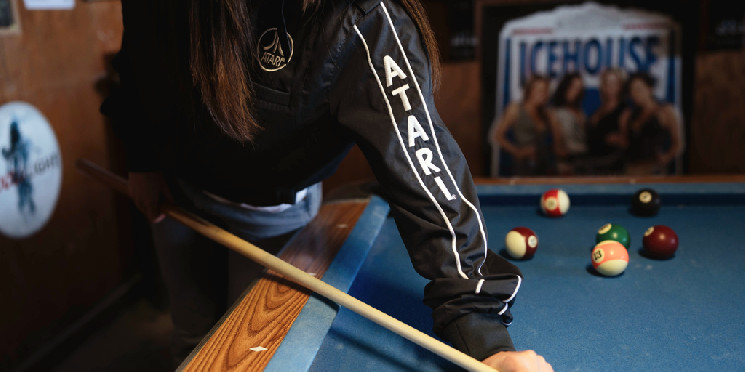The Atari club is coming back—with Members Only jackets in tow.
Retro game publisher Atari is launching new versions of its Atari Club member jackets inspired by the 1980s originals. The navy blue zip-up jackets will go on sale Thursday until December 1 and will only be available to holders of Atari’s $ARC NFTs, according to the announcement.
Compared to the original jackets, the new versions will be of a thicker material, and the Atari logo is no longer a removable patch but is instead embroidered onto the coats. It’s an official collaboration with the Members Only fashion brand that was popular in the 1980s, much like Atari itself.
While fans can buy plenty of merch without crypto, Atari’s website states that owners of the $ARC $NFT launched back in May will gain early access to merch, voting privileges, and discounts in addition to presale access to the new member jackets.
The new jackets won’t be delivered to buyers until roughly February or March of 2024, but fans will be able to buy Atari patches from the publisher’s shop in the meantime and attach them to their jackets when they arrive.
Why is Atari restricting its jacket presale to $NFT owners and launching other NFTs, like the “Onchain Summer” release it offered with Coinbase this year? Truth is, the classic gaming firm that’s been around since the 1970s has already been in crypto for a while.
Atari has been exploring blockchain integrations for roughly six years, said Atari X director Tyler Drewitz, who oversees the company’s crypto-powered activations.
“It’s a divisive space. People are apprehensive of moving into it, especially with it being so new and traditional gamers [creating] a little bit of pushback over Web3 gaming as a whole,” Drewitz told Decrypt in an interview.
While Atari has changed leadership since it began exploring crypto in 2018, the gaming company is still exploring blockchain integrations with the goal of redefining gaming.
“When Atari was founded in 1972 by Nolan Bushnell, there was no video game genre. There was no such thing as a video game,” Drewitz said. “Atari was really pushing the limits of both tech and gaming.”

“Web3 is a clear avenue of pushing the boundaries and what we believe is going to be a foundational element of the future of all tech, not only gaming,” Drewitz added. “And Atari, we’re legacy, we’re pop culture, we have a really good onboarding ramp.”
As for whether Atari might offer its $NFT fans and members’ club jacket buyers blockchain games in the future, don’t rule it out entirely. Drewitz perceives a push for crypto-powered games to be built within six months to a year, but said that such a quick timeline has led to low-quality, simple games.
However, Atari is looking into opportunities for Web3 player ownership and other perks or third-party integrations, Drewitz said.
“We’ll definitely be doing that even with some of our arcade classics and some of our titles moving forward, in a way that you may not even know it’s Web3,” Drewitz said.
Don’t expect Atari to go the “play-to-earn” route, though.
“Web3 games kind of lack a little bit of fun, because it’s all speculation and ‘How much more can I earn?’ And that takes out a little bit of the joy in a lot of them,” Drewitz shared. “So how do we enhance experiences with current Web3 games and others to make them a little bit more fun?”
 decrypt.co
decrypt.co
